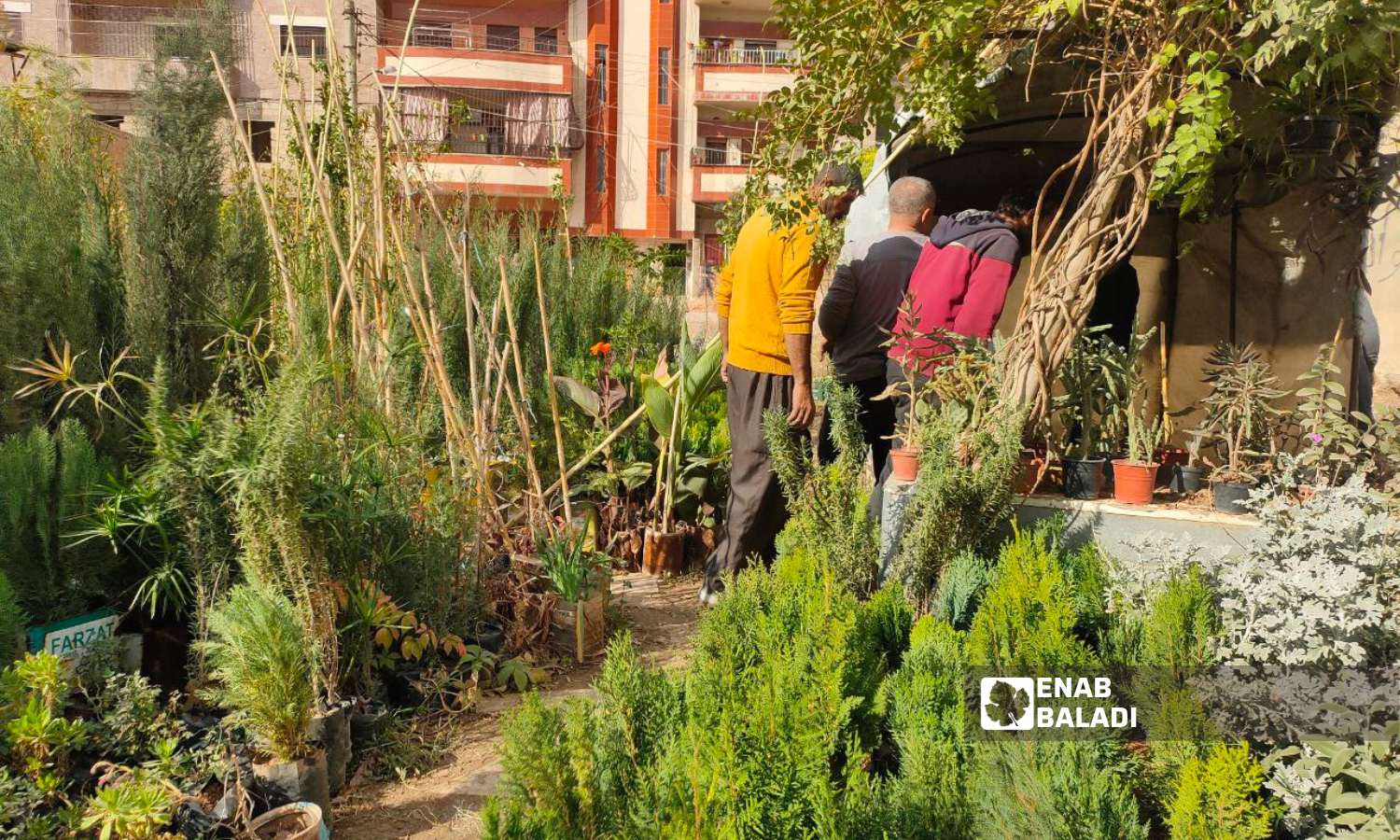



A nursery worker assists Mohammad Mansour in selecting a few seedlings and saplings of various fruit and forest trees to plant in front of his house on the outskirts of Qamishli city.
Mansour (45 years old) told Enab Baladi that he loves planting trees and wanted to have his own orchard, but “the high cost of establishing an orchard due to the rising prices of fruit and forest seedlings prevented that.”
Mansour enjoys spending some time every week wandering through the sections of nurseries scattered around the city as a hobby and “a way to relax.” During these visits, he often buys some decorative shrubs to give to friends.
Nursery owners in northeastern Syria complain about a noticeable decline in sales compared to previous years, causing them losses that cannot be compensated.
Tareq al-Ali, an agricultural engineer supervising a nursery in Qamishli, told Enab Baladi that there had been a “significant” decline in sales compared to last year, reaching about half. If this continues, nurseries will suffer losses and eventually close down “one after another” after experiencing an increase in their numbers in previous years.
Qamishli alone has about 13 nurseries selling various types of forest and fruit seedlings, located inside the city and its outskirts.
According to the engineer, the decline in sales is caused by the high prices of seedlings, some of which are sold in dollars.
“The prices of forest seedlings range from 20,000 to 60,000 Syrian pounds depending on the size and type. For example, Italian cypress can be priced at up to 60,000 Syrian pounds per seedling. As for the fruit seedlings, their prices are calculated in dollars and range from two to twenty US dollars,” al-Ali said. He added that decorative plants and trees have also witnessed an increase in prices, with some reaching up to one million Syrian pounds.
Enab Baladi found that some nursery owners rely more on organizations operating in the region than on selling to local residents. These organizations implement projects related to afforestation campaigns and environmental protection and buy “good” quantities of seedlings, being able to pay for them in dollars.
The presence of multiple nurseries has created competition in tenders for seedlings and saplings. However, the organizations’ projects are not continuous throughout the year.
Regarding the reasons for the high prices of seedlings and different types of forest, fruit, and decorative plants, Abdul Salam Hussein (36 years old), the owner of a nursery in the town of Ma’badah, told Enab Baladi that they are due to the high costs of care and daily worker wages (25,000 Syrian pounds per day), as well as the increase in prices of fertilizers sold by suppliers in dollars.
Hussein added that some types of seedlings are imported from outside the province, such as Hama or the coastal region, which requires high transportation costs, especially after the increase in fuel prices. The cost of a shipment that used to be one million Syrian pounds now costs around two million.
Regarding the popular varieties, Hussein said that city residents tend to buy decorative plants such as succulents and the coleus plant, while rural residents prefer to buy primarily fruit seedlings such as grapes, olives, pomegranates, figs, and peaches, as well as forest seedlings like cypress and pine. However, the overall increase in prices has reduced sales in rural areas.
In addition to nurseries, there are some itinerant vendors with small delivery trucks carrying seedlings and saplings to sell directly to farmers and orchard owners in villages. However, the high cost of fuel has made the profit margin small for these vendors, who have also been affected by the decline in sales.
The nurseries face “technical difficulties,” such as water scarcity during the summer season. This forces nursery owners on many days to buy water for the irrigation of seedlings and saplings at their own expense, which costs around 100,000 Syrian pounds or more depending on the size of the nursery and the nature of the included plants, according to Hussein.
The Environment Authority, affiliated with the Autonomous Administration of North and East Syria (AANES), announced the development and establishment of several nurseries in different areas of al-Hasakah, such as the development of the Malikiyah, Amuda, Ma’badah, Tal Marouf, and Tal Hamis nurseries, as well as the establishment of a new nursery in the towns of Jawadiyah and al-Yaarubiyah. It is also working on developing the Tawina nursery in al-Hasakah and the Barin nursery in Qamishli.
Mohammad Saeed, an official at the Directorate of Reserves and Afforestation at the Environment Authority in the Jazeera region, told the Ronahi website on October 3 that the development plan aims to secure all types of fruit and forest tree seeds, in addition to decorative plant seeds, production supplies, and the provision of plastic greenhouses, seedling containers, irrigation hoses, digging wells in some nurseries, and operating some of them using solar energy systems to protect the environment.
if you think the article contain wrong information or you have additional details Send Correction